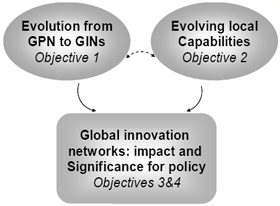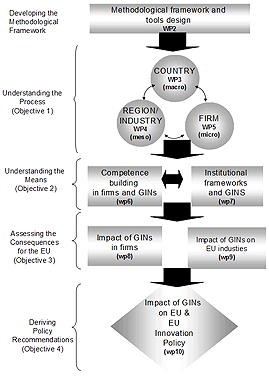INGINEUS focuses on the evolution of Global Production Networks (GPNs) into Global Innovation Networks (GINs) and the impact this new process of global capitalism has on knowledge-intensive activities in the EU. The project moves beyond traditional studies of the global location of productive activities. It focuses on a much more recent trend, namely the global location of innovation or knowledge intense activities. This global shift has greater implications for the EU than the well-known relocation of production to other geographical areas. This is because it refers to the main factor underlying competitiveness, growth performance and employment in the globalised learning economy, i.e. knowledge.
The INGINEUS research is structured in 3 sections, each one identifying a core objective:
- Section 1: Transition of Global Production Networks (GPNs) to Global Innovation Networks (GINs)
- Section 2: Evolving local capabilties
- Section 3: Impact and policy

Based on a combination of different methods and a wide industrial coverage (WP2), INGINEUS aims:
-
To analyse the relevant institutional frameworks for the creation and anchorage of global innovation networks, to finally derive specific policy recommendations for both EU and emerging economies (WP10).

This figure shows the link between work packages and objectives.
In terms of industrial coverage, the macro-economic analysis covers all industrial sectors for which data are available. The micro and meso-economic analysis focuses mainly on three industries:
1. Agro-processing
2. ICT
3. Automotive
The choice of industries is based on three different considerations:
1. Industries differ by the nature of knowledge used in their productive processes
2. Sectors can be differentiated in terms of the drivers of technical change
3. The importance of R&D as an innovation input might differ significantly among industries
It is in the three industries chosen for in-depth micro and meso-economic analysis that emerging economies seem to excel in innovation, thus rapidly increasing their role in Global Innovation Networks (GINs). Conversely, EU firms in the same industries are more likely to be affected by the increasing presence of firms from emerging economies in the knowledge-intensive activities of the value chain, challenging the core of their competitive advantage.







 objectives
objectives
